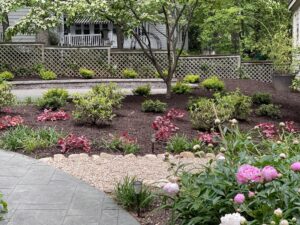
Winter weather can be tough on people and animals, but it can also be tough on plants. This past winter, many areas experienced an arctic blast of cold temperatures, including Richmond, VA and Williamsburg, VA. While these cold temperatures might seem like a temporary inconvenience, they can actually have harmful effects on how plants do in the spring and even if they survive in general.
Cold temperatures can damage plant cells and tissue, particularly when the temperatures drop suddenly or when there are fluctuations in temperature. In some cases, the cells can burst, leading to visible damage to the plant’s leaves and stem. This damage can cause the plant to be less resistant to diseases and pests in the spring, making it more difficult for the plant to grow and survive.
In addition, cold temperatures can also impact the way that plants store and use energy. When temperatures are cold, plants may slow down their metabolic processes, which can affect their ability to photosynthesize and produce energy. This can make it more difficult for the plant to grow and develop, particularly if the cold weather lasts for an extended period of time.
Another potential problem with cold temperatures is that they can cause soil to freeze. When soil freezes, the water in the soil also freezes, which can make it more difficult for plants to absorb the water and nutrients they need to survive. In some cases, the freezing can also cause the soil to become compacted, which can make it even more difficult for plants to grow.
So what can you do to help your plants survive the cold weather? One thing you can do is to make sure that your plants are well-hydrated before the cold weather hits. This can help to protect the cells and tissues from damage. You can also provide some extra protection for your plants by covering them with a frost cloth or blanket.
In addition, it’s important to be patient and wait until the weather warms up before doing any major pruning or transplanting. If you try to do these things when the weather is too cold, you could end up causing even more damage to your plants.
Overall, while the arctic blast of cold temperatures we experienced around Christmas in Richmond and Williamsburg, VA might have been a temporary inconvenience for us, it could have long-term consequences for our plants. A wait-and-see approach is best to see what plant material survived that arctic blast. This “Act of God” is not the fault of GSU Landscaping and we will work with our clients since the survival of the new plant material is a shared responsibility.






